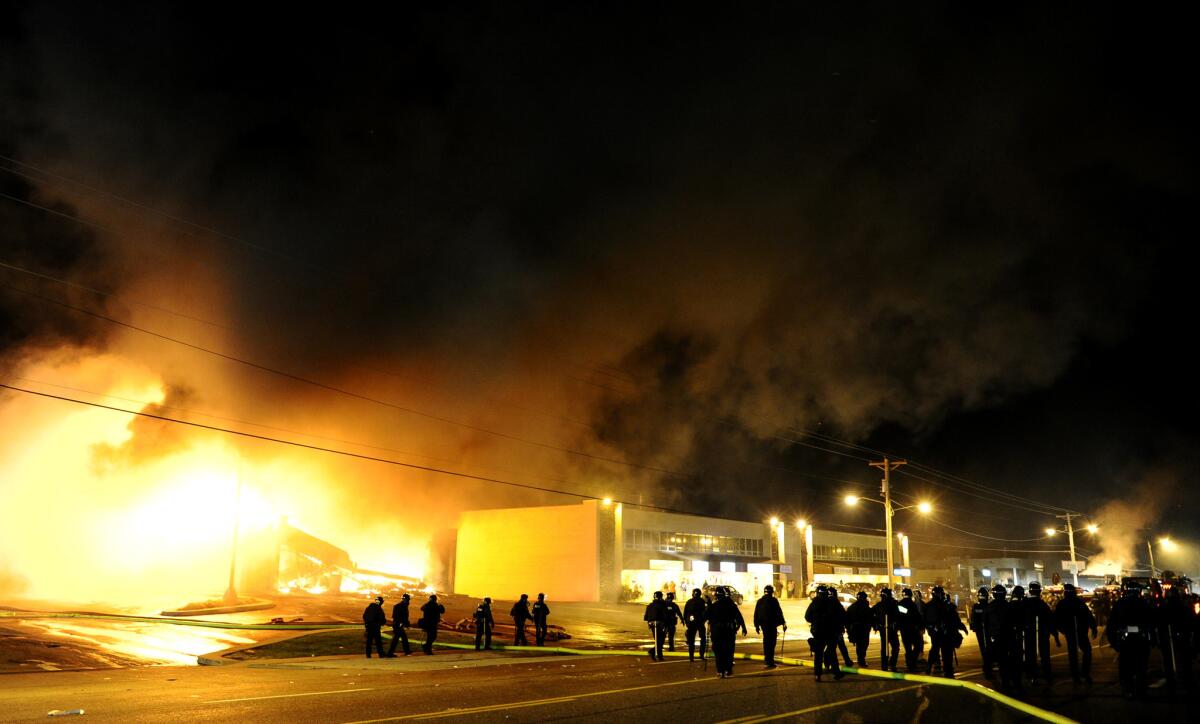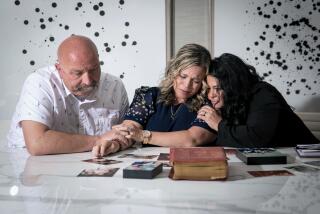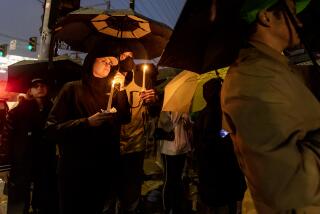Michael Brown cousin on grand jury: ‘A pain no medicine can fix’

Christine Ewings awoke Tuesday morning in her Ferguson apartment seething about the way prosecutors handled the shooting death of her cousin, Michael Brown.
“We’ve been holding our breath since August. Now it’s grieving time. It almost seems like the grieving process has just begun, days before Thanksgiving. That is just a slap in the face,” said Ewings, 46. “I’m in tears. It’s like having your heart broke -- it’s a pain no medicine can fix. I’m trying to see how I can feel and all I have is rage and disgust.”
The night before, Ewings, a phlebotomist and mother of three, had been watching the news in a nearby unit with a cousin and her aunt, Michael Brown’s grandmother, when Brown’s mother called. They hoped she had news on what the grand jury was going to do before the official announcement.
The cousin answered. After he hung up, Ewings asked what she’d said.
“Nothing,” he told her, and gave a deep sigh before leaving.
“That’s when I knew. But I still held out hope,” Ewings said. She hoped that the prosecutor would say the officer who killed her cousin would face criminal charges.
Soon after, they listened closely as St. Louis County Prosecuting Atty. Robert McCulloch began announcing that the grand jury had decided not to indict Ferguson Police Officer Darren Wilson. McCulloch went on to express sympathy for Brown’s family that, to Ewings, sounded hollow. He almost looked like he was smirking, she said.
When he revealed the grand jury’s decision, Ewings’ elderly aunt started yelling, kicking her feet as tears rolled down her cheeks.
Ewings patted her back as she started crying too. She stayed with her aunt for several hours, watching President Obama call for calm later that night. To Ewings, he was a ghost of the man she had voted for expecting change. She watched the looting that followed.
“I wanted Obama to come out and say, ‘This is out of my hands because this is how the law and the Constitution is set up, but as a black man I feel a grave injustice has been done.’ We need somebody to stand up,” she said.
Now, she said, the family has been reliving Brown’s shooting.
“I really believe Darren Wilson murdered my little cousin there in the street. I really wish it had gone to trial,” so that Wilson would be held accountable, Ewings said. She asked why Brown’s life “wasn’t worth investigating where everyone can see, not just those 12 people?”
She said she felt prosecutors had selectively presented evidence to the grand jury, including forensic evidence and conflicting witness accounts.
“They want to make you think it was all done fairly and all black and white. It wasn’t. It started out unfair. There was no professionalism about this crime scene or anything else. Look how long it took them to even come out with a police report,” Ewings said, adding, “I tell you one statement they didn’t get – Michael Brown’s.”
She said she believed McCulloch was “biased.”
“If he cared, when the family asked for an independent prosecutor, he would have stepped aside,” she said.
Maybe federal officials will hold police accountable, she said, like they did after the Rodney King case in Los Angeles. The family could file a civil case against Wilson, but money isn’t what they want, she said. They wanted a trial.
For now, Ewings said, she feels helpless.
“You’re supposed to sit back and say, ‘Oh, it’s democracy. It went through the process.’ That’s a lie. They gave it to us and told us to swallow it. You be quiet, we got the National Guard in here,” she said.
On Tuesday, she was packing up her 7- and 5-year-old daughters to go stay at her mother’s house in St. Louis. The girls had heard gunfire overnight. They knew school was canceled. Stores they frequented on nearby West Florissant Avenue had been burned and looted.
Ewings wasn’t sure what to tell her daughters, or her 16-year-old son, Daryus, who knew Brown. Before Brown’s shooting, she had sent Daryus, a good student, to stay with his father at the southern tip of the state, concerned about his safety in the neighborhood, that he might get stopped by police.
“What do we tell our kids? Respect them when they don’t respect you because they got a gun, they can shoot you down? That should not be the case,” she said. “I don’t want to crush their spirits and make them think they can’t achieve what they want in life because they’re black.
“I don’t want to make them feel inferior.”
Follow @mollyhf for national news.
More to Read
Sign up for Essential California
The most important California stories and recommendations in your inbox every morning.
You may occasionally receive promotional content from the Los Angeles Times.











